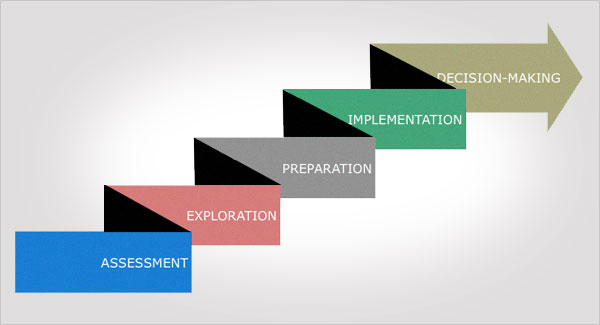The 5-STEP Career Development Model provides a comprehensive framework for assessing skills and establishing learning outcomes that demonstrate knowledge of self, career paths, and academic and career opportunities. Career decision-making is a process, and you can set your own pace in pursuing career development accordingly. If you work with a career coach and take advantage of the CEC’s programs and resources you will be better prepared to make informed and meaningful career decisions.

Step 1: Assessment
Get to know yourself – Begin to identify your values, interests, skills, personal traits and career satisfiers in order to identify the ingredients of a good career “fit”:
- Take self and personality assessments
- Meet with a career coach for help with assessments and early planning
- Begin to identify career fields and/or academic programs that fit your interests and abilities
- Create a draft resume and have a career coach review it
- Complete your Handshake profile
Step 2: Exploration
Explore and research career possibilities – Learn the connections between academic programs, experiential learning, previous professional experiences, and careers:
- Conduct career research and gather information from valuable online resources
- Gather information on different fields, industries and companies
- Decide on a major and learn what career paths a major can offer
- Conduct informational interviews with people in fields that interest you
- Explore opportunities to gain relevant work experience, such as internships, summer jobs, or volunteer work
- Attend career and networking events
Step 3: Preparation
Develop your resume and cover letter writing skills; refine your career goals and strategy – Through informational interviewing, internships, and part-time/temporary or summer jobs, “test the waters” and determine a potential career direction:
- Create an effective resume and cover letter
- Research graduate schools and visit campuses
- Learn to present your goals and skills in an elevator pitch
- Conduct informational interviews and build your network
- Develop and practice your interview skills
- Test it out – for example, Obtain an internship. Internships may be limited to undergraduate and graduate students, or recent graduates. Other populations can consider doing volunteer or temporary positions.
- Develop a Career Action Plan
Step 4: Implementation
Develop and implement your job search or graduate school strategy – Develop the skills you need to accomplish your goals:
- Sharpen your job search skills and develop a list of potential employers
- Prepare for interviews and practice interviewing skills with a mock interview
- Network with friends, parents, faculty, alumnae/i and others
- Gather graduate school application materials and write a personal statement
- Attend events such as career fairs, company presentations and career-related forums with alumnae/i
Step 5: Decision-Making
Make an informed and meaningful career decision – Gain insight into necessary professional development skills to be successful:
- Refer back to your career goals, interests, strengths, and values for guidance
- Analyze job offers/graduate school admissions and weigh your options
- Meet with a career coach to walk through your decision-making
- Consider the practical aspects of life after Simmons, and attend the senior series in the spring to help make this transition






